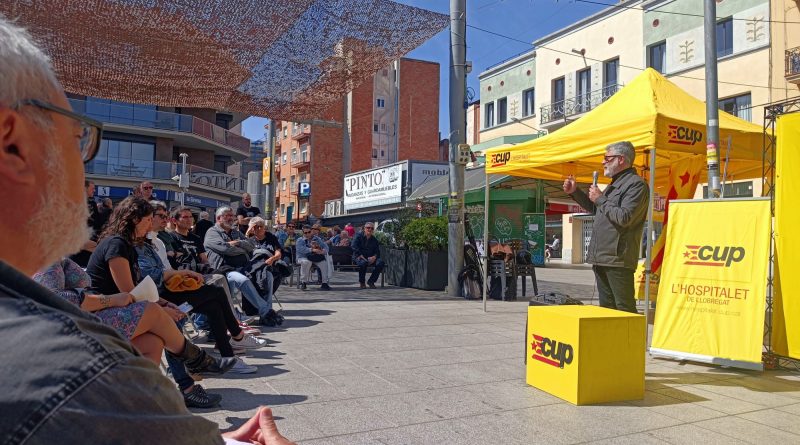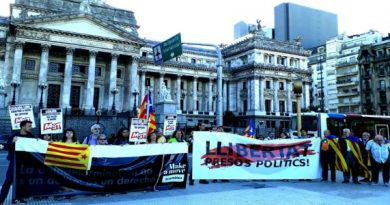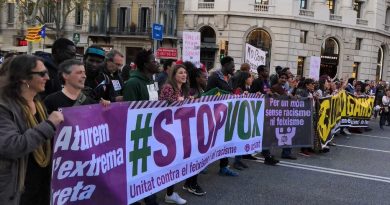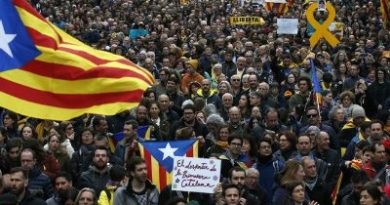Carlos Riera: "Our challenge is to build popular unity in the Catalan Countries"
The presentation of the candidacy of the CUP L'Hospitalet began with a speech by Carles Riera, one of the deputies of the CUP in the Parliament. finished the act, We took the opportunity to ask you a few questions..
Why did you start your speech emphasizing the capitalist crisis?
I have started my speech by referring to the capitalist crisis because I believe that it is the global and local context that affects us in a more decisive way.. It is a capitalist crisis that affects the working class around the world., making their working conditions and living conditions precarious, generating an increase in inequalities and an increasingly large transfer of resources from the popular classes to capital. For example, through the dwelling. Thus, It is a crisis that is worsening at the moment and this has a determining role in terms of the living conditions of the popular classes.. It is also decisive from the point of view of the social and political consequences. It is the context in which we have to work.. It is a capitalist crisis that is generating an unprecedented climate crisis and that also has consequences from the point of view of the working class because it is the most affected, emerges as the most affected on a global scale as a consequence of this climate change. Thus, we have an acceleration, a worsening of the capitalist crisis with the acceleration of climate change and that affects the working class around the world in a special way. It is a fundamental determinant that we must know how to detect, interpret and analyze and from which we must draw the corresponding conclusions from the social and political point of view. Obviously, we are in an act of presentation of our candidacy of LH and certainly our candidacy has given concrete account of the consequences of this crisis in the territory of LH, in its popular classes and in its working class, this is inescapable.
How is the CUP positioned in relation to the PSOE-Podemos “progressive coalition” government and the ERC-JxCAT government??
We consider that in the context of the Spanish State, of the State and the regime of '78, the struggle for national liberation, the struggle for independence is a fundamental instrument for breaking with the regime and, Thus, of rupture with the State structures in which the regime of the ‘ 78 and capital are organized in order to reproduce their political and economic power, their extractivist policies and exploitation of territories, of the working and popular classes and of the State as a whole. Because, for us the independence struggle is inseparable from the socialist struggle, as is the fight against patriarchy and now the fight to rescue the territory and the climate from the threats of climate change.
The PSOE-Podemos government in the Spanish State and the ERC government and at the time of JxCAT in the Generalitat, represent respectively the frustration of 15M and the frustration of October 1. That is to say, are those governments that come to power under the impulse of a wave of changes, that challenges corruption, the democratic deficit of the State and the serious capitalist crisis of the 2008. The other, the great crisis of the 1st and 3 October, of the struggle for self-determination and independence that meant a challenge to the State, the regime and a democratic revolt that could also open the door to a social and political revolution of a pro-independence nature, in which opportunities to break with the regime and, Thus, also of progress in the fight for social rights, civilians and politicians of the popular classes of our country. The two governments represent the limits of the hegemonic parties that have wanted to appropriate these popular struggles to return them again to the reorganization of the State, to the reorganization of capital and the stabilization of the '78 regime. Thus, they are government formations, government moments, that we have to overcome and that we have to overflow from the social and popular struggles, in order to also move our institutions towards the rupturist terrain with the State and capital.
What are the prospects for the municipal elections and the challenges of the CUP?
We consider the municipal elections as a challenge, as an opportunity to enter the Town Halls and there be the expression of the social movements, of the popular struggles and of the working class and there dispute the power and hegemony of the State, to capital, to the right and to fascism, Thus, we must take into account the consequences of the capitalist crisis. This indicates some very specific fronts of struggle: for the right to housing, against job insecurity, to guarantee public services for the popular classes and to internalize that these services are currently in the hands of capital. Thus, We want to build municipal sovereignty to put the Town Halls, services and public policies at the service of the working class.
Do you want to add something??
Now our challenge is to build popular unity in the Catalan Countries, locally and nationally. A popular unity through social struggle, union, worker, for the right to housing and for the defense of the territory, of the feminist and anti-repressive struggle, of the fight for social rights, civil and political. To regain the initiative, overwhelm the institutions and the hegemonic parties towards new dynamics of popular democratic insurrection and generate a dynamic of rupture with the State and capital in the Catalan Countries. This is our goal, the challenge we set ourselves. The municipal elections are an opportunity to sharpen and intensify this process of struggle of the movements and social struggles in the Town Halls and build community. This is fundamental in the local territories and in the Town Halls, build communities of solidarity, of mutual aid as the material base of this popular unity. From here, from the Town Halls, but also from all institutions. Y, from the streets, generate processes of overflow of social struggle, of the struggles for social rights, civil and political and the independence struggles. Generate overflows, popular organization and generate the conditions of rupture with the State, regime and capital.




